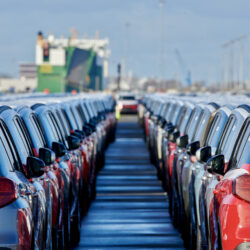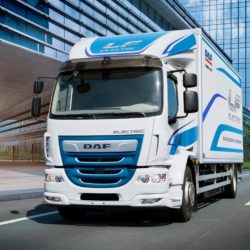Ports awash with unsold Chinese e-cars

The overflow car parks at European ports are currently awash with (mostly Chinese) electric cars. The cause: falling sales and a shortage of transporters.
Across Europe, ports are struggling with a large influx of cars, which then sit there twice as long as normal – sometimes for up to 18 months. This is according to analysis by Dutch financial newspaper Het Financieele Dagblad. It mainly concerns Chinese e-cars, from brands such as BYD, MG, Great Wall, SAIC, Geely and Xpeng, but also models of originally Western brands made in China, such as Tesla, Polestar, the Volvo EX30 and the BMW iX3.
The port of Zeebrugge (pictured), Europe’s largest car terminal with 100,000 parking spaces, is already completely full. A first shipment of new Explorers 1 from BYD, in February, therefore ended up having to divert to Vlissingen, while the ports of Rotterdam and Amsterdam also had to step in.
Exports of Chinese e-cars ramping up
Chinese e-car brands are ramping up exports to an unprecedented level. In 2023, the country passed Japan as the world’s largest car exporter. Exports rose 57.9% in a year to 5.26 million cars, according to the China Passenger Car Association. Europe in particular is a sought-after export destination, as China faces a 27.5% import tariff in the United States.
At the same time, electric car sales in Europe have lagged behind expectations in recent months. Germany, accounting for a quarter of European car sales, has ended its subsidies on electric cars, and carmakers describe the appetite for electric driving as “smaller than expected”.
Disappointing sales
Both Tesla and BYD faced disappointing sales figures in the first quarter of this year. In fact, global sales of China’s BYD during the period were 43% lower than in the first three months of 2023. In addition, there is an acute shortage of trucks and drivers to transport the cars from ports. The same goes for ships to distribute the cars via short routes elsewhere in Europe.










